Happiness and Philosophy: Reflecting on Epicurus, Aristotle & Plato
VerifiedAdded on 2023/05/27
|5
|954
|60
Essay
AI Summary
This essay presents a student's reflection on happiness, defining it as reaching one's potential beyond material wealth. It explores the perspectives of Epicurus, who links happiness to physical and mental contentment, and Aristotle, who emphasizes virtue as the path to eudaimonia. The reflection incorporates these philosophical insights, arguing that true happiness involves enjoying small pleasures, acting virtuously, and striving for one's best potential. The author contrasts this with the modern acquisitive society, which they believe hinders the pursuit of genuine happiness. Ultimately, the essay synthesizes personal views with philosophical concepts to define a holistic understanding of happiness.
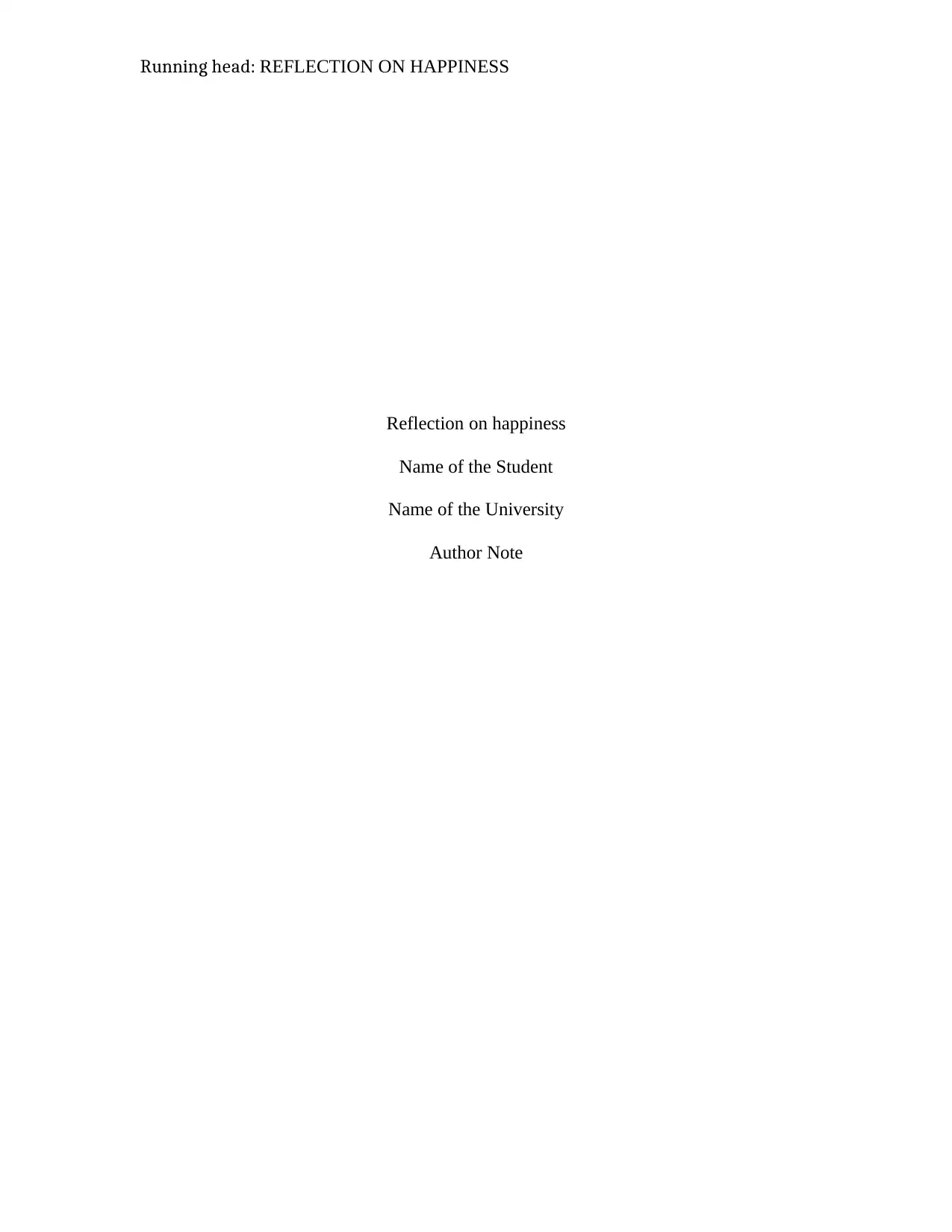
Running head: REFLECTION ON HAPPINESS
Reflection on happiness
Name of the Student
Name of the University
Author Note
Reflection on happiness
Name of the Student
Name of the University
Author Note
Paraphrase This Document
Need a fresh take? Get an instant paraphrase of this document with our AI Paraphraser
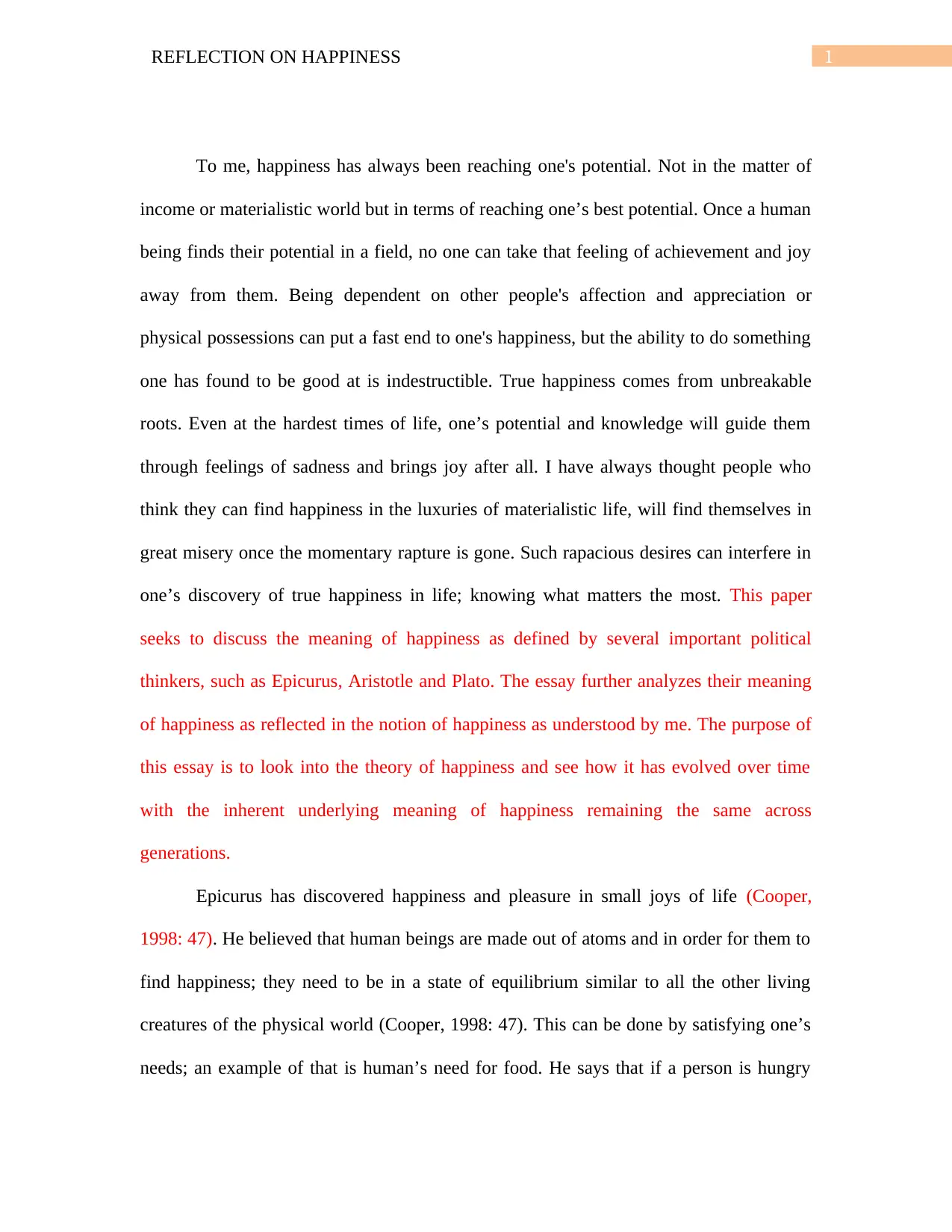
1REFLECTION ON HAPPINESS
To me, happiness has always been reaching one's potential. Not in the matter of
income or materialistic world but in terms of reaching one’s best potential. Once a human
being finds their potential in a field, no one can take that feeling of achievement and joy
away from them. Being dependent on other people's affection and appreciation or
physical possessions can put a fast end to one's happiness, but the ability to do something
one has found to be good at is indestructible. True happiness comes from unbreakable
roots. Even at the hardest times of life, one’s potential and knowledge will guide them
through feelings of sadness and brings joy after all. I have always thought people who
think they can find happiness in the luxuries of materialistic life, will find themselves in
great misery once the momentary rapture is gone. Such rapacious desires can interfere in
one’s discovery of true happiness in life; knowing what matters the most. This paper
seeks to discuss the meaning of happiness as defined by several important political
thinkers, such as Epicurus, Aristotle and Plato. The essay further analyzes their meaning
of happiness as reflected in the notion of happiness as understood by me. The purpose of
this essay is to look into the theory of happiness and see how it has evolved over time
with the inherent underlying meaning of happiness remaining the same across
generations.
Epicurus has discovered happiness and pleasure in small joys of life (Cooper,
1998: 47). He believed that human beings are made out of atoms and in order for them to
find happiness; they need to be in a state of equilibrium similar to all the other living
creatures of the physical world (Cooper, 1998: 47). This can be done by satisfying one’s
needs; an example of that is human’s need for food. He says that if a person is hungry
To me, happiness has always been reaching one's potential. Not in the matter of
income or materialistic world but in terms of reaching one’s best potential. Once a human
being finds their potential in a field, no one can take that feeling of achievement and joy
away from them. Being dependent on other people's affection and appreciation or
physical possessions can put a fast end to one's happiness, but the ability to do something
one has found to be good at is indestructible. True happiness comes from unbreakable
roots. Even at the hardest times of life, one’s potential and knowledge will guide them
through feelings of sadness and brings joy after all. I have always thought people who
think they can find happiness in the luxuries of materialistic life, will find themselves in
great misery once the momentary rapture is gone. Such rapacious desires can interfere in
one’s discovery of true happiness in life; knowing what matters the most. This paper
seeks to discuss the meaning of happiness as defined by several important political
thinkers, such as Epicurus, Aristotle and Plato. The essay further analyzes their meaning
of happiness as reflected in the notion of happiness as understood by me. The purpose of
this essay is to look into the theory of happiness and see how it has evolved over time
with the inherent underlying meaning of happiness remaining the same across
generations.
Epicurus has discovered happiness and pleasure in small joys of life (Cooper,
1998: 47). He believed that human beings are made out of atoms and in order for them to
find happiness; they need to be in a state of equilibrium similar to all the other living
creatures of the physical world (Cooper, 1998: 47). This can be done by satisfying one’s
needs; an example of that is human’s need for food. He says that if a person is hungry
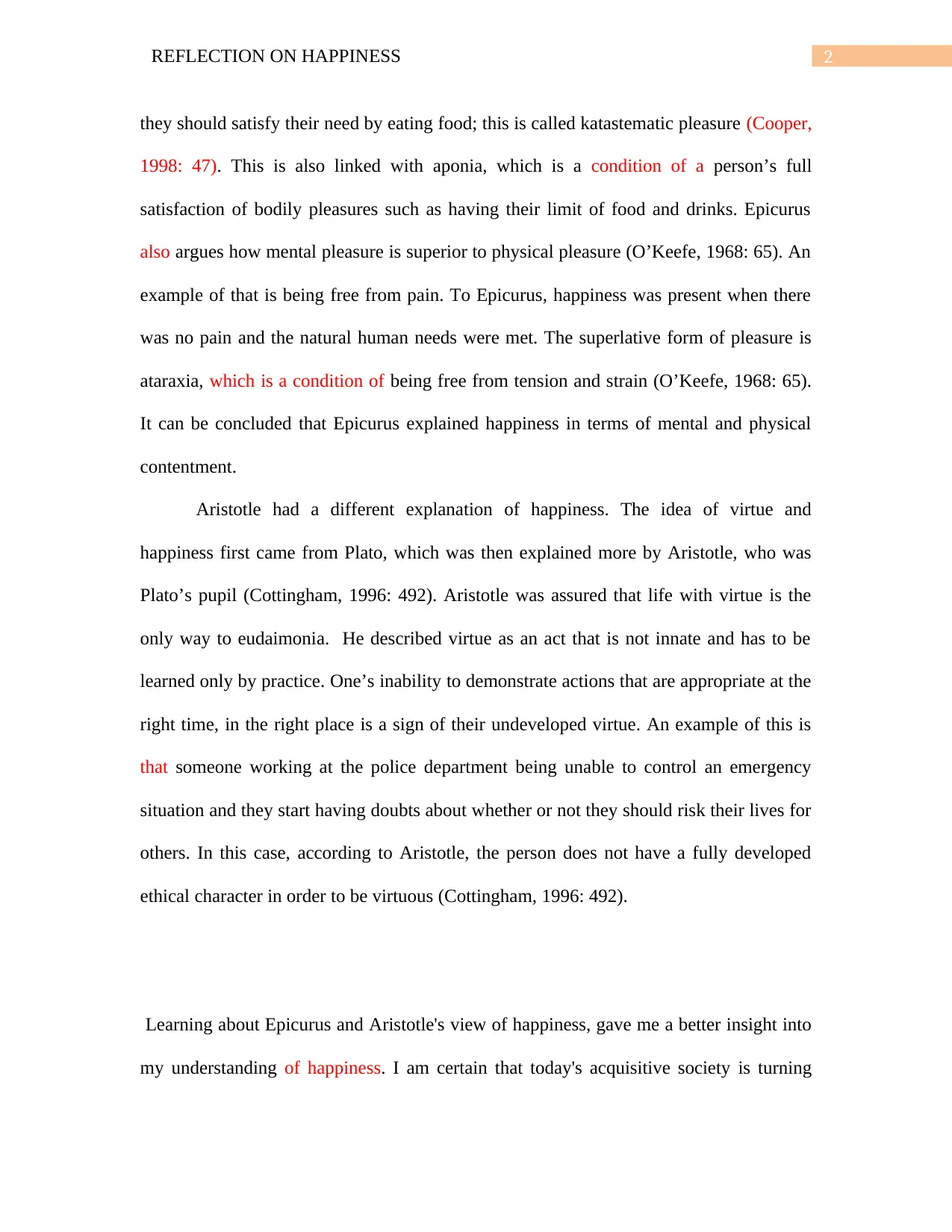
2REFLECTION ON HAPPINESS
they should satisfy their need by eating food; this is called katastematic pleasure (Cooper,
1998: 47). This is also linked with aponia, which is a condition of a person’s full
satisfaction of bodily pleasures such as having their limit of food and drinks. Epicurus
also argues how mental pleasure is superior to physical pleasure (O’Keefe, 1968: 65). An
example of that is being free from pain. To Epicurus, happiness was present when there
was no pain and the natural human needs were met. The superlative form of pleasure is
ataraxia, which is a condition of being free from tension and strain (O’Keefe, 1968: 65).
It can be concluded that Epicurus explained happiness in terms of mental and physical
contentment.
Aristotle had a different explanation of happiness. The idea of virtue and
happiness first came from Plato, which was then explained more by Aristotle, who was
Plato’s pupil (Cottingham, 1996: 492). Aristotle was assured that life with virtue is the
only way to eudaimonia. He described virtue as an act that is not innate and has to be
learned only by practice. One’s inability to demonstrate actions that are appropriate at the
right time, in the right place is a sign of their undeveloped virtue. An example of this is
that someone working at the police department being unable to control an emergency
situation and they start having doubts about whether or not they should risk their lives for
others. In this case, according to Aristotle, the person does not have a fully developed
ethical character in order to be virtuous (Cottingham, 1996: 492).
Learning about Epicurus and Aristotle's view of happiness, gave me a better insight into
my understanding of happiness. I am certain that today's acquisitive society is turning
they should satisfy their need by eating food; this is called katastematic pleasure (Cooper,
1998: 47). This is also linked with aponia, which is a condition of a person’s full
satisfaction of bodily pleasures such as having their limit of food and drinks. Epicurus
also argues how mental pleasure is superior to physical pleasure (O’Keefe, 1968: 65). An
example of that is being free from pain. To Epicurus, happiness was present when there
was no pain and the natural human needs were met. The superlative form of pleasure is
ataraxia, which is a condition of being free from tension and strain (O’Keefe, 1968: 65).
It can be concluded that Epicurus explained happiness in terms of mental and physical
contentment.
Aristotle had a different explanation of happiness. The idea of virtue and
happiness first came from Plato, which was then explained more by Aristotle, who was
Plato’s pupil (Cottingham, 1996: 492). Aristotle was assured that life with virtue is the
only way to eudaimonia. He described virtue as an act that is not innate and has to be
learned only by practice. One’s inability to demonstrate actions that are appropriate at the
right time, in the right place is a sign of their undeveloped virtue. An example of this is
that someone working at the police department being unable to control an emergency
situation and they start having doubts about whether or not they should risk their lives for
others. In this case, according to Aristotle, the person does not have a fully developed
ethical character in order to be virtuous (Cottingham, 1996: 492).
Learning about Epicurus and Aristotle's view of happiness, gave me a better insight into
my understanding of happiness. I am certain that today's acquisitive society is turning
⊘ This is a preview!⊘
Do you want full access?
Subscribe today to unlock all pages.

Trusted by 1+ million students worldwide
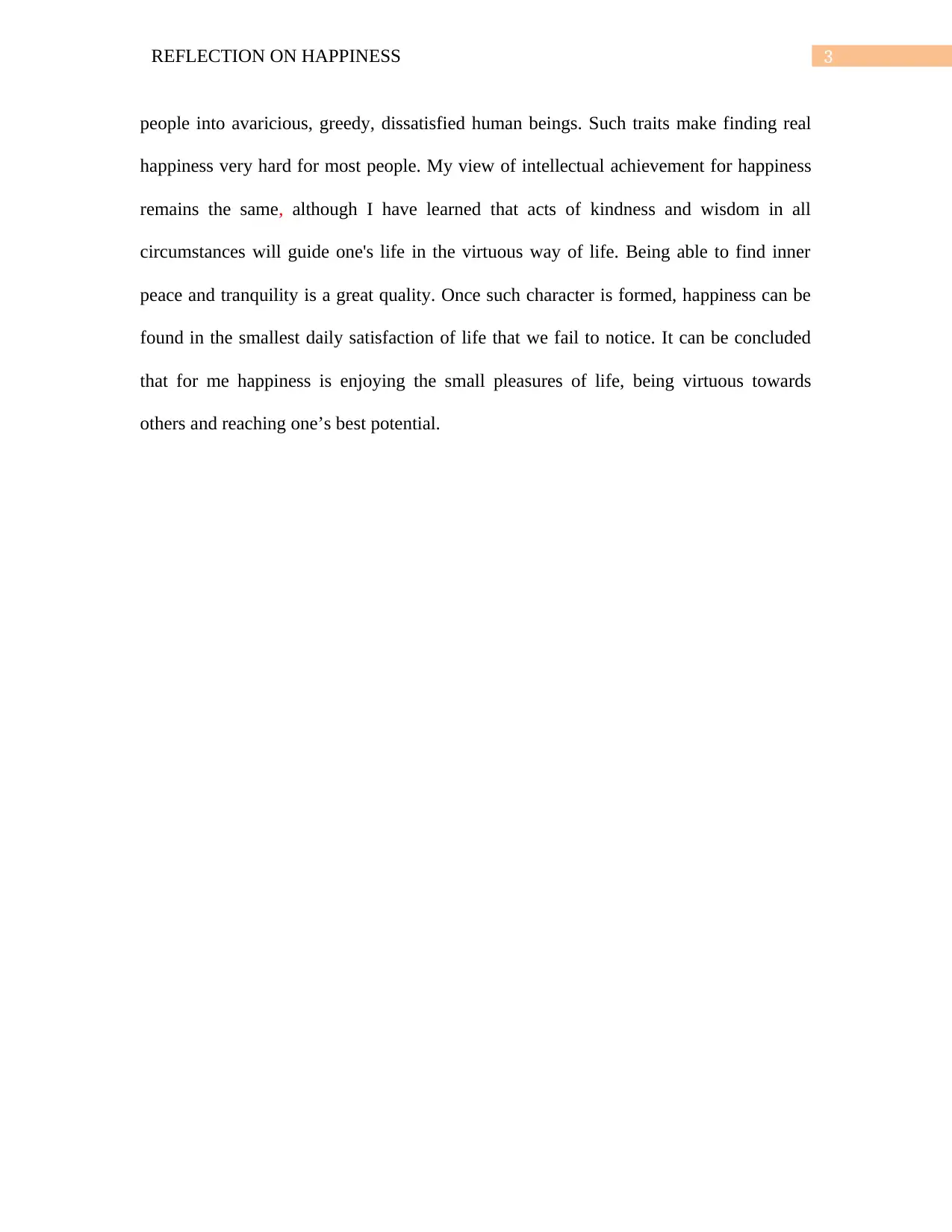
3REFLECTION ON HAPPINESS
people into avaricious, greedy, dissatisfied human beings. Such traits make finding real
happiness very hard for most people. My view of intellectual achievement for happiness
remains the same, although I have learned that acts of kindness and wisdom in all
circumstances will guide one's life in the virtuous way of life. Being able to find inner
peace and tranquility is a great quality. Once such character is formed, happiness can be
found in the smallest daily satisfaction of life that we fail to notice. It can be concluded
that for me happiness is enjoying the small pleasures of life, being virtuous towards
others and reaching one’s best potential.
people into avaricious, greedy, dissatisfied human beings. Such traits make finding real
happiness very hard for most people. My view of intellectual achievement for happiness
remains the same, although I have learned that acts of kindness and wisdom in all
circumstances will guide one's life in the virtuous way of life. Being able to find inner
peace and tranquility is a great quality. Once such character is formed, happiness can be
found in the smallest daily satisfaction of life that we fail to notice. It can be concluded
that for me happiness is enjoying the small pleasures of life, being virtuous towards
others and reaching one’s best potential.
Paraphrase This Document
Need a fresh take? Get an instant paraphrase of this document with our AI Paraphraser
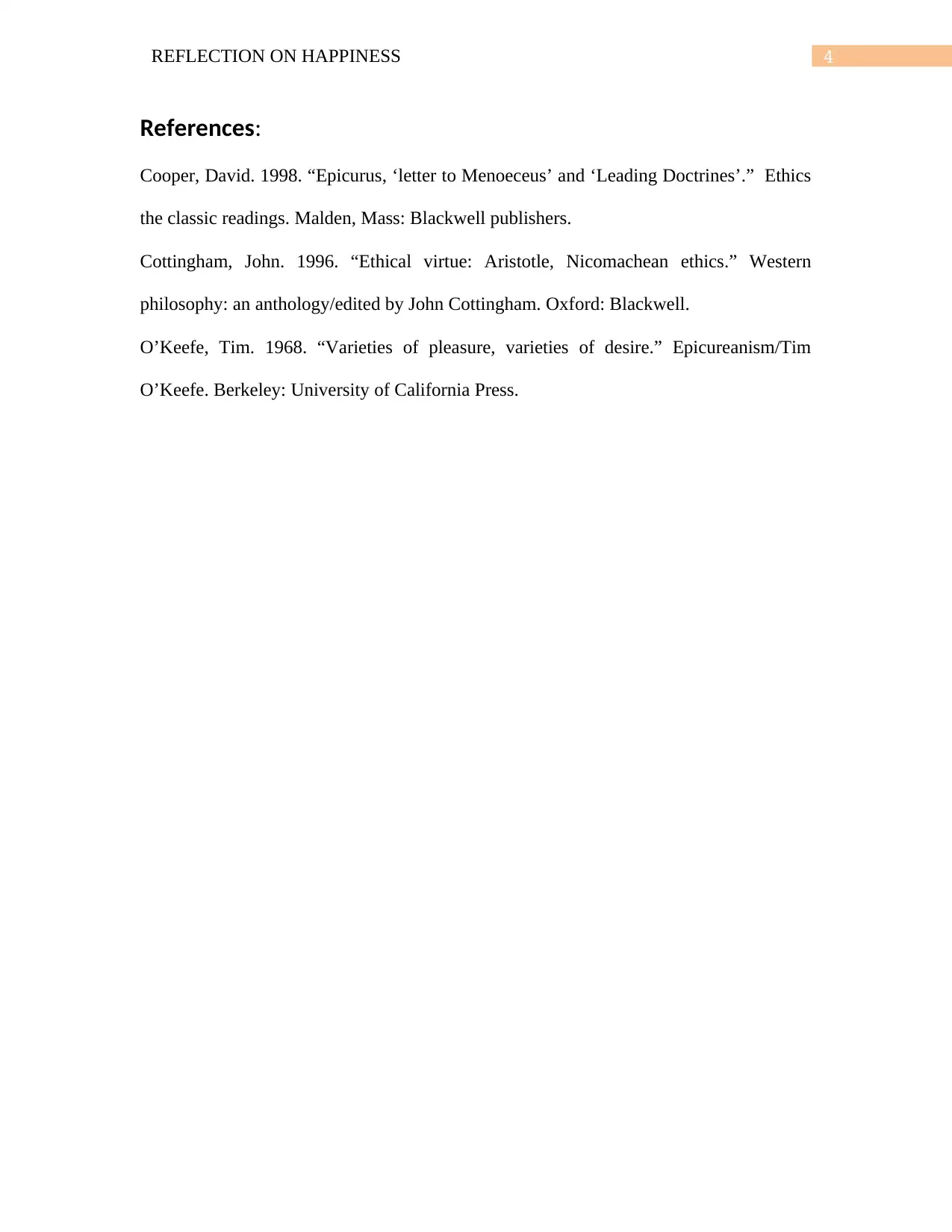
4REFLECTION ON HAPPINESS
References:
Cooper, David. 1998. “Epicurus, ‘letter to Menoeceus’ and ‘Leading Doctrines’.” Ethics
the classic readings. Malden, Mass: Blackwell publishers.
Cottingham, John. 1996. “Ethical virtue: Aristotle, Nicomachean ethics.” Western
philosophy: an anthology/edited by John Cottingham. Oxford: Blackwell.
O’Keefe, Tim. 1968. “Varieties of pleasure, varieties of desire.” Epicureanism/Tim
O’Keefe. Berkeley: University of California Press.
References:
Cooper, David. 1998. “Epicurus, ‘letter to Menoeceus’ and ‘Leading Doctrines’.” Ethics
the classic readings. Malden, Mass: Blackwell publishers.
Cottingham, John. 1996. “Ethical virtue: Aristotle, Nicomachean ethics.” Western
philosophy: an anthology/edited by John Cottingham. Oxford: Blackwell.
O’Keefe, Tim. 1968. “Varieties of pleasure, varieties of desire.” Epicureanism/Tim
O’Keefe. Berkeley: University of California Press.
1 out of 5
Your All-in-One AI-Powered Toolkit for Academic Success.
+13062052269
info@desklib.com
Available 24*7 on WhatsApp / Email
![[object Object]](/_next/static/media/star-bottom.7253800d.svg)
Unlock your academic potential
Copyright © 2020–2026 A2Z Services. All Rights Reserved. Developed and managed by ZUCOL.

